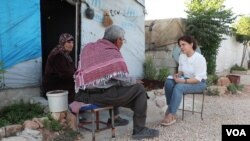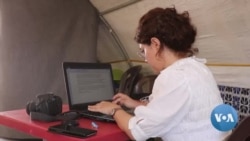Editor’s Note: In 2018, Syrian reporter and VOA contributor Nawroz Rasho fled bombing in her home city of Afrin. She is now one of more than 100 million people displaced worldwide. From her new home in the Shabha camp for internally displaced people or IDPs, Rasho, 31, continues to report on the lives of those around her. The following has been translated from Kurdish and edited for length and clarity.
Afrin is beautiful. It has mountains and forests all around and is known for its abundant olive trees and fine olive oil.
From 2012, the region was under the control of Kurdish forces. We had certain newfound freedoms. My journalism at that time centered on reflecting the beauty of Afrin and covering the new political dynamics that were unfolding.
But war and displacement after Turkish forces invaded in 2018 turned my life upside down.
I had no choice but to join thousands of other residents who sought safety in a nearby mountain area, hoping to return when the situation calmed. While there, I continued to report.
My father and a brother stayed behind. But our home is close to the Turkish border and it came under shelling.
A relative called to break bad news: my father was killed during a Turkish bombardment.
I was devastated. The war was overwhelming, and I couldn’t process the situation.
My father’s death made me realize even more how important journalism is. It made me understand how journalists, under these circumstances, become part of the story. They can be victims too.
I realized that journalism, for people like myself, is more than just a job.
I became a displaced person along with thousands of Afrin residents, scattered in at least six displacement settlements throughout northern Syria.
I didn’t know what the future would hold, but I thought that living in this camp, in Shahba, would be temporary.
I had the chance to leave the camp and the country. But what made me stay and resume my journalism was that I had experienced the same difficulties as other displaced people.
I saw many stories that needed to be told and shared with the world.
Refugees and forcibly displaced people have many stories that go beyond the flight from home. Each one of us has a story that represents the plights of refugees anywhere in the world.
My reporting became a bridge to connect the displaced with their relatives on the outside. It has changed many people’s lives.
For instance, in 2019 I reported on a man named Jiwan.
In 2016, while fighting against Islamic State militants in northern Syria, he lost his left hand and eye.
When he arrived in the camp, he had no prospect for a good future. But he found passion for playing the drums.
Despite his physical disability and the tough conditions in the camp, he nurtured his newfound passion for music.
It took a lot of convincing before he agreed to an interview. He wasn’t sure he was ready to appear in front of a camera.
But after VOA published his story in Kurdish and English, it moved a lot of people and encouraged Jiwan to continue his music.
The publicity led him to holding small concerts and participating in wedding parties inside the camp. He is a well-known drummer now.
These stories make me believe in the power of journalism and the positive impact it has on many people, even under the most difficult circumstances.
Of course, being a reporter who lives in a displacement camp is challenging.
My colleagues and I don’t have a proper space and adequate equipment. Electricity and internet access are always an issue.
But we turned a tent into a media hub where we try to create a better working environment and a sense of camaraderie.
If there is one thing that gives me hope and keeps me going, it is undoubtedly telling the stories of my fellow displaced residents.






